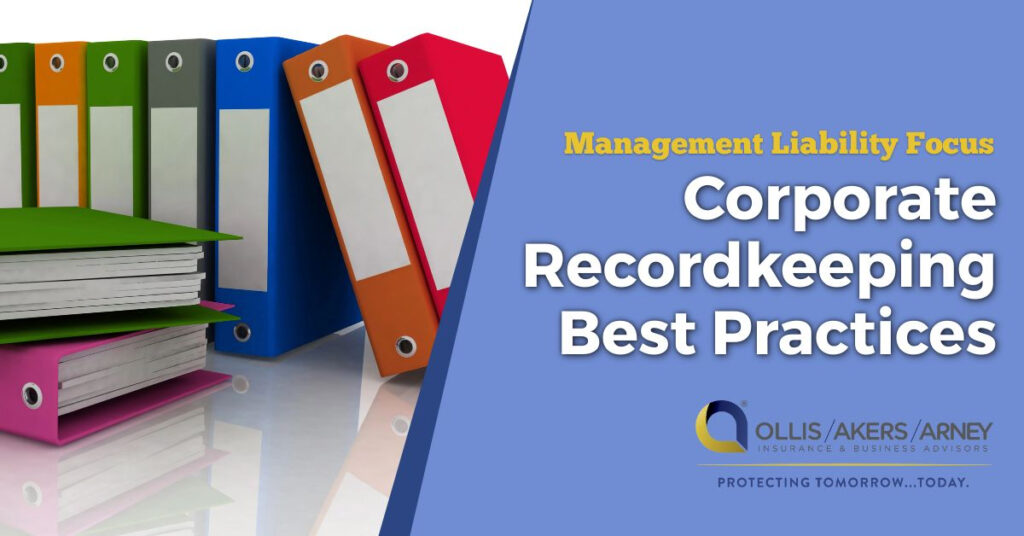As corporate leaders, a company’s directors and officers have a range of responsibilities, many of which center around ensuring operational success, fostering a strong organizational culture, and complying with applicable federal and state laws. One of the most essential responsibilities these leaders have is keeping detailed and accurate corporate records. Such records encompass various types of documentation and serve as a company’s log of board member decisions and activities. Adequate recordkeeping can benefit corporate leaders in several ways, allowing them to fulfill their board member duties, demonstrate solid governance measures, avoid potential legal concerns and minimize liability exposures. As such, it’s crucial for directors and officers to know how to collect and maintain corporate records properly. This article provides more information on such documentation, highlights the value of sufficient recordkeeping and outlines related best practices for companies to consider.
What Are Corporate Records?
Corporate records refer to official paperwork that a business must complete and keep up to date in order to meet certain regulatory requirements and operational standards, some of which may vary based on the company’s legal structure and state of incorporation. These records can include:
- Articles of incorporation—This documentation formalizes a company, its different departments and its leadership structure.
- Corporate standards—Commonly called bylaws, these documents specify a company’s internal rules and corporate governance policies.
- Board meeting minutes—This documentation includes in-depth notes from a company’s board meetings, recording key conversations and summarizing any resolutions or decisions made.
- Shareholder information—These documents provide a breakdown of share ownership within a company and any related transfers or investments.
- Financial and legal records—This documentation consists of a company’s annual report filings, tax statements, audit notes, stock registers, financial data and compliance-related paperwork.
- Important agreements—These documents pertain to the contracts a company has with its workforce, vendors, partners and other stakeholders. Examples include employment paperwork, nondisclosure agreements and vendor service contracts.
Altogether, this documentation can help recount a company’s key functions and actions over time. Directors and officers play an integral role in corporate recordkeeping for several reasons. Namely, many of these leaders’ duties—whether it’s establishing and approving new bylaws, identifying and resolving certain organizational challenges, upholding specific reporting protocols or maintaining proper board oversight—involve creating or referencing corporate records. Most companies have designated board members (e.g., corporate secretaries and compliance officers) who are responsible for gathering and retaining such documentation.
The Value of Corporate Recordkeeping
Proper recordkeeping is critical for any company. Specifically, it can benefit businesses and their directors and officers by promoting the following:
- Bolstered compliance—Many jurisdictions and industry groups have corporate reporting and documentation standards that require businesses to maintain certain records. Thus, recordkeeping can help a company and its board members comply with applicable legislation, stay in good standing and avoid costly legal penalties.
- Enhanced liability protection—Directors and officers face significant liability in their roles. Fortunately, recordkeeping can help uphold the “corporate veil” by distinguishing between a company’s legal identity and the personal assets of its shareholders. As a result, board members can invest in the business without fear of personal losses amid corporate financial or legal troubles.
- Increased board effectiveness—Recording board meeting minutes and documenting related resolutions can encourage directors and officers to stay focused on current tasks and uphold solid governance measures. Corporate recordkeeping can also support more informed decision-making processes, ultimately boosting board effectiveness.
- Greater accountability and transparency—Corporate records can provide a company with greater visibility of its board members’ actions. With these records, the business can better identify potential issues (e.g., inaccurate reporting, employee mistreatment, mismanaged funds or self-dealing) and hold corporate leaders responsible for their wrongdoings. This, in turn, can facilitate corporate audits and regulatory reviews while cultivating a company culture of accountability and transparency.
- Operational resilience—Corporate recordkeeping can help directors and officers uphold their fiduciary duties, as adequate documentation allows these leaders to conduct their due diligence during organizational changes, such as mergers, acquisitions and new investments. Maintaining corporate records can also showcase a detailed history of a company’s activities over the years, making it evident when strategic shifts are necessary and demonstrating an ongoing commitment to good governance. This can enhance a company’s credibility, resulting in greater loyalty among stakeholders and paving the way for continued operational success.
Recordkeeping Considerations
For corporate recordkeeping to be beneficial, it must be done properly. Here are some best practices for companies to implement:
- Adopt a records management policy. First and foremost, businesses need to establish a records management policy. This policy should outline a clear system for corporate record creation, retention, maintenance and disposal. It should also provide the recommended format for different types of records (i.e., paper or digital). Having such a policy in place can help keep records organized, accurate and easily accessible.
- Keep adequate meeting minutes. Notes from board member meetings are some of the most valuable corporate records, as they can help guide major organizational developments. To ensure a detailed collection of meeting minutes, companies should stick to a consistent schedule for updating and categorizing these records accordingly. In most cases, it’s sufficient to document noteworthy discussions and big decisions made during board meetings within 48 hours and organize these records by date for simple retrieval. Waiting any longer to document these minutes, especially without proper categorization, will likely reduce record accuracy and make it harder to find key meeting details in the future. Additionally, all meeting minutes should be approved, dated and signed by corporate secretaries.
- Maintain centralized and secure storage. It’s best for businesses to store their corporate records in one reliable location. For example, paper documents can be organized in a file cabinet(s), while digital records can be saved on a trusted cloud platform. In any case, these records should be protected with ample security measures. Physical security options include locks, cameras and alarm systems, whereas cybersecurity options entail multifactor authentication, advanced threat detection software and frequent data backups.
- Ensure confidentiality. Many corporate records contain sensitive information, making them subject to data privacy requirements. This means companies need to take extra steps to safeguard these records, such as encrypting confidential files and using the principle of least privilege to restrict access to protected data. Companies also need to include specific notification protocols in their business continuity and incident response plans that outline what to do when private documents are compromised.
- Provide proper training. Businesses should conduct routine awareness training to educate designated board members on the importance of corporate recordkeeping and associated best practices. This training should highlight record management measures, documentation requirements for meeting minutes, file storage protocols, and relevant recordkeeping and reporting legislation. As recordkeeping practices evolve and change, this training should follow suit.
- Conduct regular reviews. Companies should periodically review their corporate records for potential issues, such as missing documents, outdated files and inaccurate information. These reviews should also assess whether current recordkeeping practices are still sufficient or if certain adjustments are needed to address evolving legislation, legal exposures or organizational shifts.
Conclusion
Corporate records are vital documents that serve many purposes, mainly to chronicle impactful activities among a company’s directors and officers. Proper recordkeeping can make all the difference in helping businesses and their board members maintain compliance, limit liability concerns, increase operational efficiencies and keep stakeholders satisfied. Contact us today for additional risk management guidance.
For informational purposes only. Not intended as legal advice. © 2025 Zywave, Inc. All rights reserved


